
Ian Payne 4am - 7am
26 July 2023, 21:36 | Updated: 26 July 2023, 22:29
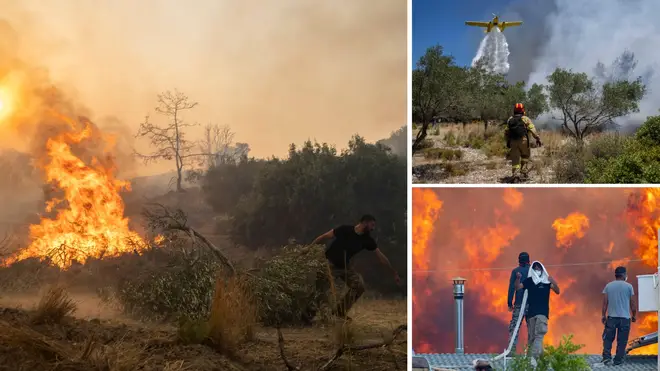
More than 40 people have died as a result of extreme weather as European countries and parts of North Africa battle deadly temperatures.
Fires have spread to eight other countries in the Mediterranean as high temperatures and winds have created the “perfect storm” for the fires to spread.
Portugal, Italy, France, Turkey, Croatia, Spain and parts of North Africa have been affected by the wildfires.
It comes after Rhodes declared a state of emergency on Wednesday which will remain in place for the next six months.
Six other regions in Greece were also issued a ‘level 5 extreme risk’ alert for wildfires on Wednesday.
Evacuation orders were also issued on Wednesday evening for Volos and Lamia, two areas close to central Greek cities as they are at risk of new wildfire outbreaks.
Greece’s Civil Protection Ministry said that some areas of Attica, Central Greece, the Peloponnese region, Western Greece, Thessaly and Central Macedonia are at risk.
Greek prime minister Kyriakos Mitsotakis said: “All of us are standing guard. In the face of what the entire planet is facing, especially the Mediterranean, which is a climate change hot spot, there is no magical defence mechanism.”
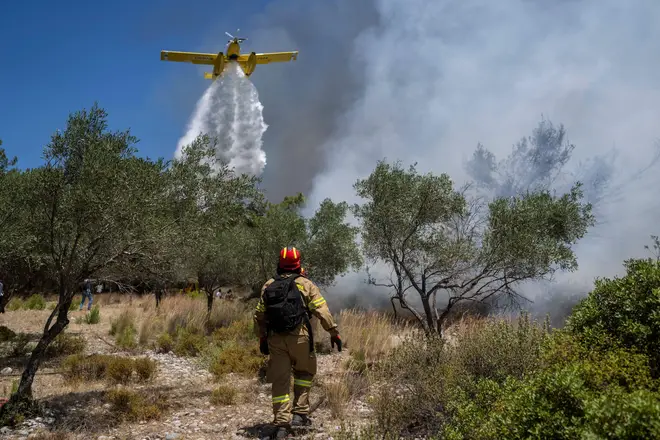
Authorities have evacuated more than 20,000 from Rhodes, followed by around 2,500 in Corfu.
Seven people in Italy are believed to have died as a result of extreme heat and storms, while at least 34 have died in Algeria, including 10 soldiers who were encircled by flames.
Temperatures in Greece could reach as hot as 46C. People are being told to remain indoors during the hottest period of the day and use fans or air-conditioning to stay cool.
The over-40s temperatures aren’t set to last - with forecasters predicting a drop of between six to eight degrees in the next couple of days.
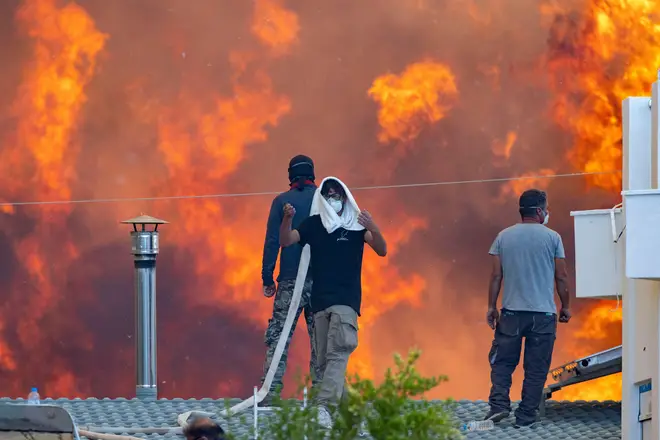
Thousands of British people are still believed to be stranded on islands like Rhodes, although tour operators and airlines are laying on repatriation flights to take holidaymakers home.
Three people are thought to have died in the wildfires, including two pilots whose plane crashed on Tuesday while attempting to drop water on a fire.
A farmer in a hard-to-reach area has also been found burned to death.
The country's Prime Minister Kyriakos Mitsotakis warned on Monday that Greece had "another three difficult days ahead", suggesting that conditions could improve on Friday.
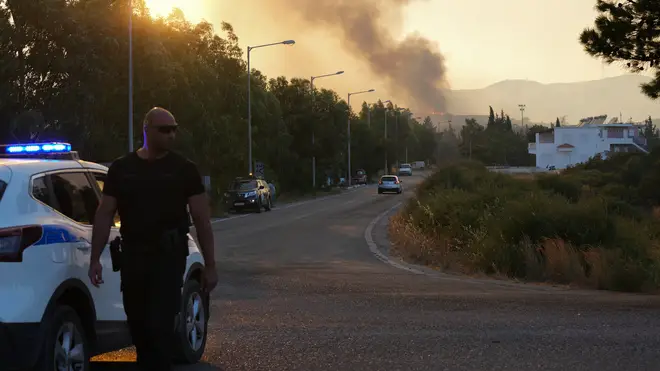
Temperatures are set to hit 46C on Wednesday, but could drop down to the mid-30s on Thursday, with the possibility of storms.
He said: "All of us are standing guard. In the face of what the entire planet is facing, especially the Mediterranean which is a climate change hot-spot, there is no magical defence mechanism."
Mr Mitsotakis paid tribute to Captain Christos Moulas, 34, and his co-pilot, Second Lieutenant Periklis Stefanidis, 27, who died in a brave effort to put out a fire on Evia. The 41-year-old farmer who died was burned to death on the same island.
The Prime Minister said: "They offered their lives to save lives. They proved how hazardous their daily missions in extinguishing fires are".
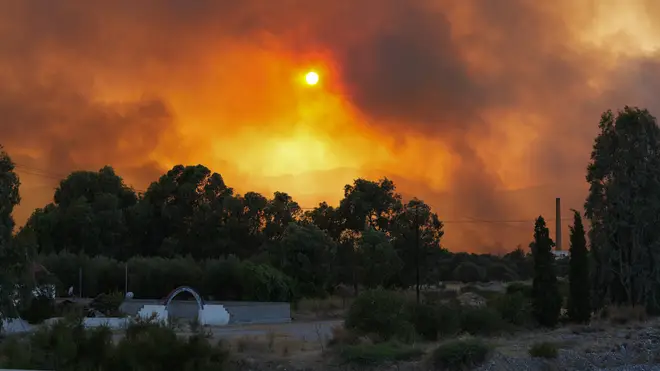
He added: "In their memory, we continue the war against the destructive forces of nature."
Hundreds of firefighters have been trying to put out the flames, including brigades from Turkey, Serbia and Slovakia.
Several other Mediterranean countries, including Italy, Algeria and Spain, have also suffered wildfires over the past week, amid a scorching heatwave in the region.
Palermo Airport on the Italian island of Sicily was shut down on Tuesday morning because of approaching wildfires. The airport was reopened later that morning when firefighters got the blaze under control.
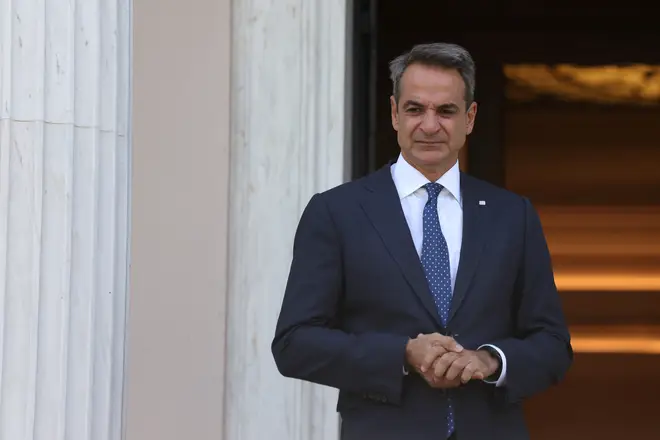
On Tuesday the Foreign Office updated advice on Greece to prospective travellers, as it reminded them to “make sure you have appropriate insurance”.
It added that the fires were “highly dangerous and unpredictable” and were “in populated areas on the mainland and a number of islands”.
The advice is accompanied by the department’s previous unchanged advice to “contact your travel operator or accommodation provider before you travel to check that it is not currently impacted”.
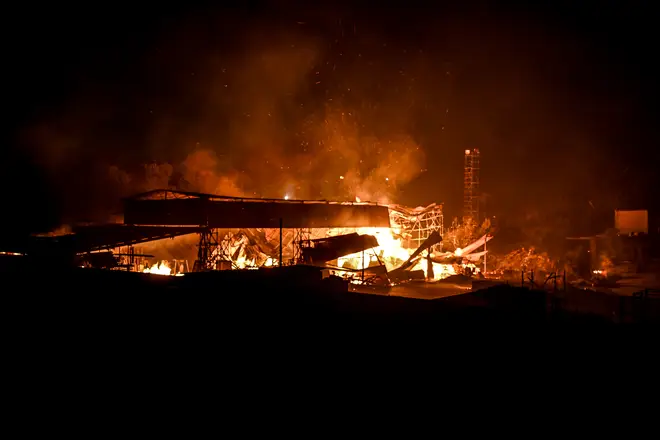
It comes after the Foreign Office has been criticised by ministers as they urge the government to formally advise holidaymakers against travelling to Rhodes or any other Greek island affected by the blazes.
Many of the thousands stranded on Rhodes have been left with no choice but to flee the flames on foot or sleep in refuge centres and the airport.
Around a dozen flights departed from Rhodes to the UK on Tuesday evening - this includes services from TUI, Jet2 and easyJet.
Foreign Office Minister Andrew Mitchell said on Monday morning up to 10,000 Brits were on Rhodes - including those on unaffected parts of the island.
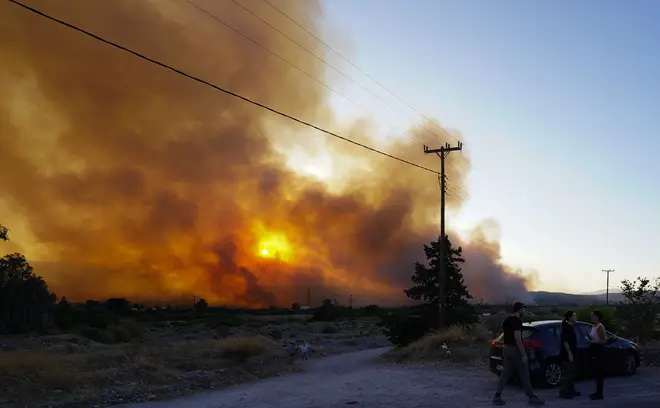
TUI has cancelled package holidays to Rhodes until August 11, while easyJet has cancelled package holidays until Saturday 29 July.
Labour’s Baroness Angela Smith urged the government to “rethink” its travel guidance to Brits in the House of Lords.
While Lib Dem foreign affairs spokeswoman Layla Moran said the advice should be changed to “enable the thousands of British tourists due to fly to Rhodes to safely cancel their holidays without being left out of pocket”.
A formal warning from government would make it easier for holidaymakers to claim a refund on their holidays with less risk of losing out on cash.
On Tuesday Greek officials confirmed the death of two pilots tackling blazes after their plane nose-dived in a fireball crash.